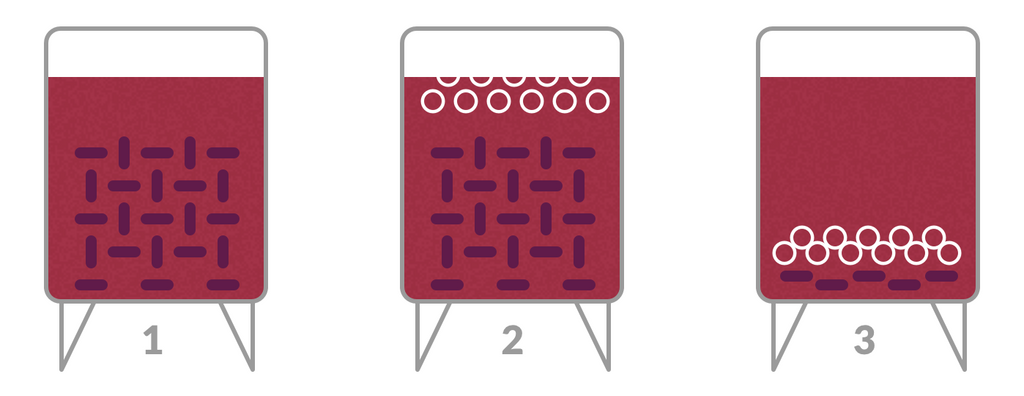Vegan wine explained
the snapshot
Vegan wine is a wine in which no fining agent of animal origin is used during the fining process.
Overview
As we have seen in our exploration of natural wine , wine in its purest form is, in fact, fermented grape juice. So why are some wines not vegan? To answer this question, we must take a step back and analyze the wine clarification process. Most wines undergo the clarification process, with the exception of unclarified and unfiltered wines.
The clarification process
The main objective of clarification is to free the wine from the solid matter in suspension. The result is a clear wine where the number of solid particles is negligible. The clarification is carried out in two complementary and successive phases:
1 wine clarification : addition of a clarifier, which combines with the solid particles of the wine, forming a compound that is easy to remove.
2 wine filtration : elimination of the compound formed by the clarifier, separating the solid matter from the liquid matter.
How does wine clarification work?

1 Fermented wine with sediment: dead yeast cells, grape skin, pips, stem pieces, solid particles.
2 The Fining agents are added to wine in liquid or powder form. Clarifying agents may be of animal origin.
3 Clarifying agents combine with solid particles creating easier to filter compounds.
Clarifying agents of animal origin
The culprit in non-vegan wine is the fining agent, which can often be of animal origin. If a wine has been fined with one of the following fining agents of animal origin, it cannot be considered vegan. Unclarified and unfiltered wines, like most natural wines, are therefore suitable for vegans.
egg white
Egg white is a clarifier that can be used in the clarification and stabilization of wine. Egg white is widely used and is very effective, especially for red wines.
Egg white is the fining agent of choice to reduce tannins, which cause that feeling of astringency, in red wines made from highly tannic grape varietals.
Casein
Casein is a milk protein that when dissolved in wine combines with solid matter and precipitates suspended particles.
Casein is mainly used to clarify white wines which tend to oxidize faster than red wines, turning brown.
Jelly
Gelatin, made from boiling animal tissue, is a very common fining agent for red wines. Gelatin is added to wine in crystals.
Fish tail
Fish glue is a gelatin made from the bladder of a gallon of fish that is mainly used to clarify white wines.
Clarifying agents not of animal origin
In addition to fining agents of animal origin, which we have introduced in the previous paragraph, there are several other non-animal fining agents. These are of vegetable origin, extracted from algae or in the case of tannins from grape skins, or synthetic.
clarified v. Undefined and unfiltered
Wine clarification is a very common practice in modern winemaking. Most conventionally made wines are clear from suspended solids and the bottles tend not to have any deposits.
However, we will briefly explore the drawbacks of clarification; this will also allow us to understand why natural winemakers tend to avoid it altogether. That's right, natural wines are often not clarified or filtered.
Fining has substantial consequences on the following three components, which give a wine its true character and contribute to its overall health:
► Tannins: they are responsible for the structure and aging capacity of a wine, acting as preservatives.
► Pigmentation: the result of clarification is usually an adulteration of the natural color of the wine.
► Yeasts, enzymes and other bacteria: These act as stabilizers and contribute greatly to the flavor of a wine.
On the other hand, supporters of clarification claim that unclarified and unfiltered wines, in addition to being cloudy, can cause digestive problems for consumers or present significant defects.
While there is no scientific or empirical basis for anyone to say that unclarified and unfiltered wines are unhealthy for wine drinkers, if anything, quite the contrary, it is common knowledge that clarification is used to correct deeply flawed wines. .
Conclusion
Vegan wines are not hard to find but they are not the most common wines on the market. At Bebedistinto.com we pride ourselves on specifically looking for vegan wines. As a general rule, natural, biodynamic and organic wines are also vegan, especially natural wines, which are not refined or filtered. After all, the natural winemaker's motto is "nothing added, nothing removed!"
If you weren't aware that wine can be non-vegan, we hope that after reading this article you will be able to make more informed decisions when purchasing wine. However, if you have doubts about any of our products or need clarification, no pun intended, do not hesitate to contact us at hello@bebedistinto.com.
